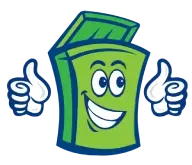Recycling is a vital practice for conserving resources, reducing waste, and protecting the environment. Despite its importance, many people are unsure how to start or improve their recycling habits. In this post, we’ll discuss the importance of recycling and provide practical tips on how to get started.
1. Understanding the Importance of Recycling:
Recycling offers numerous environmental and economic benefits, including:
- Conserving natural resources: Recycling materials like paper, plastic, glass, and metal reduces the need for raw materials, preserving forests, water, and minerals.
- Reducing energy consumption: Manufacturing products from recycled materials often requires less energy than producing them from new materials. For example, recycling aluminum saves up to 95% of the energy needed to produce new aluminum.
- Decreasing landfill waste: Recycling diverts waste from landfills, reducing their environmental impact and extending their lifespan.
- Mitigating pollution: Recycling reduces pollution by decreasing the need for extraction, refining, and processing of raw materials.
- Supporting the economy: The recycling industry creates jobs and generates economic activity through the collection, processing, and sale of recyclable materials.
2. What Can Be Recycled:
Commonly recyclable materials include:
- Paper and cardboard: Newspapers, magazines, office paper, cardboard boxes
- Plastics: Bottles, containers, packaging (check local guidelines for accepted types)
- Glass: Bottles and jars (rinse and remove lids)
- Metals: Aluminum cans, steel cans, tin cans
- Electronics: Computers, phones, batteries (e-waste recycling programs)
Check your local recycling program for specific guidelines on what can be recycled in your area.
3. How to Start Recycling:
Starting a recycling habit is easy with these simple steps:
a. Set Up a Recycling System: Designate bins or containers for different types of recyclables in your home. Label them clearly to avoid confusion. Place them in convenient locations, such as the kitchen or garage, to encourage consistent use.
b. Learn Local Guidelines: Familiarize yourself with your local recycling program’s guidelines. Understand what materials are accepted, how they should be prepared, and where to drop them off or have them collected. Some communities offer curbside pickup, while others have drop-off centers.
c. Reduce Contamination: Ensure that recyclables are clean and dry before placing them in the bin. Rinse containers to remove food residue and avoid placing non-recyclable items in the recycling bin. Contaminated recyclables can spoil the entire batch, making it unsuitable for recycling.
d. Educate Your Household: Involve everyone in your household in the recycling process. Teach them the importance of recycling and how to properly sort and prepare recyclables. Encourage them to make recycling a daily habit.
e. Stay Informed: Stay updated on changes to your local recycling program and new recycling opportunities. Participate in community events and programs that promote recycling and sustainability.
4. Going Beyond Basic Recycling:
Once you have established a basic recycling routine, consider expanding your efforts:
- Composting: Start composting organic waste like food scraps and yard trimmings to reduce landfill waste and create nutrient-rich soil for gardening.
- Upcycling: Get creative and find ways to repurpose items instead of throwing them away. Upcycling can turn waste into useful and artistic products.
- Reducing Waste: Practice waste reduction by choosing products with minimal packaging, using reusable items, and buying in bulk.
Conclusion:
Recycling is a simple yet impactful way to protect the environment and conserve resources. By understanding its importance and following practical steps to get started, you can make recycling a regular part of your life. Remember to set up a recycling system, learn local guidelines, reduce contamination, educate your household, and stay informed. Going beyond basic recycling with composting, upcycling, and waste reduction can further enhance your environmental efforts. Start recycling today and contribute to a sustainable future.

